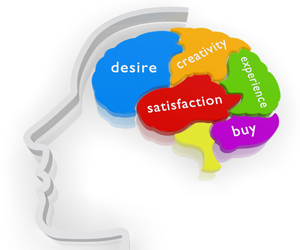Have you ever heard of neuromarketing? It is the bridge between neuroscience and marketing that let us understand the human behavior by analysing brain activities. Simplier definition as Patrick Renvoise, father of neuromarketing, would sum up; neuromarketing is ‘the science of human decision.’ This is a rising field among advertisers, brand managers and marketing professionals at large whose job is to understand and influence the buying decisions of end customers.
We had the privilege to interview Mr. Patrick Renvoise just a few weeks before the Neuromarketing Conference in Istanbul, where he will be conducting a neuromarketing workshop.
The brain is the least known organ in the human body. Despite the latest technological advances, the brain’s capabilities continue to surprise scientists every day. As an engineer whose focus was on sales and marketing, how did you become interested in the brain? Could you tell us a bit about your journey towards a career in neuromarketing?
Besides my life in sales and marketing I have always been fascinated by the brain. I have been reading about the brain for 25 years and one day I had a epiphany: people tell you ‘you have to sell to the decision maker and we fail to realize that the decision maker is an organ – the brain, not a person!’ So if the decision maker is an organ, I started to look at what neuroscientists like Damasio, Ledoux, Rapaille and others say about how the brain works and I realized that nobody had ever translated these findings (probably because the brain is so complicated) into what business people should do to really help their customers say “yes.” It took me almost 2 years to form the model which created a bridge between neuroscience and marketing and we published it in the form of a map called the NeuroMap.
Certain social sciences developed sub categories that investigate neurological aspects in their particular fields. For example, neuroeconomics examines economic decision making by analysing brain activity. In simple words, how would you describe neuromarketing? What are the unique techniques?
Depending on who you ask, you’ll get different versions of the definition of neuromarketing. In the simplest form, it is the science of human decision. In a more generally accepted definition; it is the use of physiological measures (facial coding, eye tracking, voice analysis, skin conductance, heart rate, blood pressure, pupil dilation, EEG and MRI) to better understand people’s preferences and choices. What we do at SalesBrain is actually called “applied neuromarketing,” whereby we use a predictability model based on how the brain responds to certain stimuli.
In your view, is neuromarketing a science or business field? What can we learn about brands, consumers and decision making through neuromarketing methods that we didn’t already know utilizing classical marketing tools? (i.e. market research, focus groups, field work…)
The problem with traditional marketing is that it doesn’t work. Why? Simply because we ask people what they want and based on their responses we build products or services. But we know that people don’t really know what they want, so basing a marketing strategy on the opinions of the customers is a flawed process. To convince yourself of this, you can read “How customers think” by Zaltman (Marketing Professor at Harvard University) or just trust the late Steve Jobs when he said we don’t do marketing at Apple because people don’t know what they want.
Can you give us an example of a brand who successfully utilized neuromarketing tools to understand consumer behavior and implement better marketing strategies?
An example of a very successful use of neuromarketing is in the movie industry because everytime you release a new movie you have to start the promotion of that movie from zero and the main tool used to promote the film is a trailer: a 30 sec to 2 min excerpt of the movie. Well now a number of studios do some testing of the trailers using MRI. It gives them a better indication of the impact of the trailers than the traditional measures using interviews where you ask people: which trailer did you prefer? Or recall test conducted a few weeks later when you ask people: Did you remember this trailer or a particlar scene in the trailer?
Considering neuromarketing solely as a business field, is it ethical to manipulate brain activities to influence consumer preferences and buying decisions?
The NMSBA (Neuromarketing Science and Business Association) just published its rules of ethics and these rules should be followed by anybody who wants to offer neuromarketing services. Neuromarketing is the next step in better understanding what people want. In the end people still have free will and the consumers are not naive: they know companies are trying to sell them something. If done ethically neuromarketing can also help the consumer better understand his/her preference: why am I inclined to buy this brand versus the other, why I am drawn to watch this movie after seeing this trailer etc….
Harsh critiques of neuromarketing fear that advertisers could come up with a ‘buy button’ and manipulate masses into buying certain products or imposing on a certain political agenda. Do you think neuromarketing could have such immense power?
No, I don’t think neuromarketing has hidden powers! By the way, we talk about the ‘buy button’ in the metaphorical sense in order to explain what we do.
People are always afraid of the new and the unknown. In the year 1000, they thought it was going to be the end of the world. In the year 2000, people predicted that it would also be the end of the world because of a total collapse of all computers (the 2000 software bug) yet nothing happened. Neuromarketing is an evolution in the techniques of marketing. (some may call it a revolution) Just like with anything new, you’ll find charlatans and not so ethical people who will try to influence their audience in a way that could harm them. Luckily there will be organizations like the NMSBA that will define clear rules for people to play within the limits of the game. For example, at SalesBrain we decided early that we wouldn’t want to work for tobacco companies because we believe it is not in the general public interest to smoke more.
If so, are there any protection mechanisms?
Yes, the NMSBA code of ethics for example.
You are the speaker at the upcoming Neuromarketing Conference in Istanbul on November 28th. What will be the focus of your work-shop?
The focus is teaching people a model of predictability of why and how people make decisions. So we will describe the NeuroMap (see pic above) and suggest that this map is the most effective way to find the buy button! We will start by describing a triune model of the brain:
Then we’ll present the only 6 stimuli that can influence the true decision maker the reptilian brain:
This above is the neurosceince part of our sessions. Then we will transalte those findings into 4 steps or questions that people should answer if they want to maximize their probability of finding that buy button:
Who do you think would benefit the most from attending the conference?
Any sales and marketing executive, any CEO and more generally anybody whose job is to influence others. The session is equally revelant for an experienced VP of Sales and Marketing at a $Billion company and a young marketing professional:
1. the veteran VP can benefit because he or she will realize that they do these things naturally and it will reinforce everything they have learned in a lifetime experience.
2. the not so experienced professional will gain the benefit of a lifetime wisdom of sales/marketing in a 1 or 2 day session.
Currently are there any neuromarketing efforts in Turkey?
As far as I know, neuromarketing is only utilized in the field of market research. We are working together with PTMS in Turkey in order to expand neuromarketing efforts in sales and marketing. We will be organizing a workshop at the Neuromarketing Conference on November 28th in Istanbul. You can get further info on the company’s webpage www.ptms.com.tr.
• This interview’s Turkish translation was published on November 13 in Dunya Gazetesi.
Who is Patrick Renvoise?
Patrick Renvoise is the Co-Founder & Chief Neuromarketing Officer of SalesBrain, the world’s first neuromarketing coaching company. After teaching electronics at the University of La Réunion, France, for several years, Patrick spent 15 years marketing complex high tech solutions. After selling multi-million-dollar super-computers to NASA, Boeing, Shell, Canon, BMW, Airbus and more, he met with some of the smartest people on earth and he became fascinated by the human mind.
Using his engineering background, his sales expertise, and a compelling desire to seek the truth about Sales & Marketing, Patrick discovered the role of the Reptilian Brain –in yellow on the cross hair —in the process of decision making and he developed the only neuromarketing model available today. So far, SalesBrain has trained 34,000 executives worldwide including 10,000 CEOs.

 Turkish Labor Law
Turkish Labor Law



